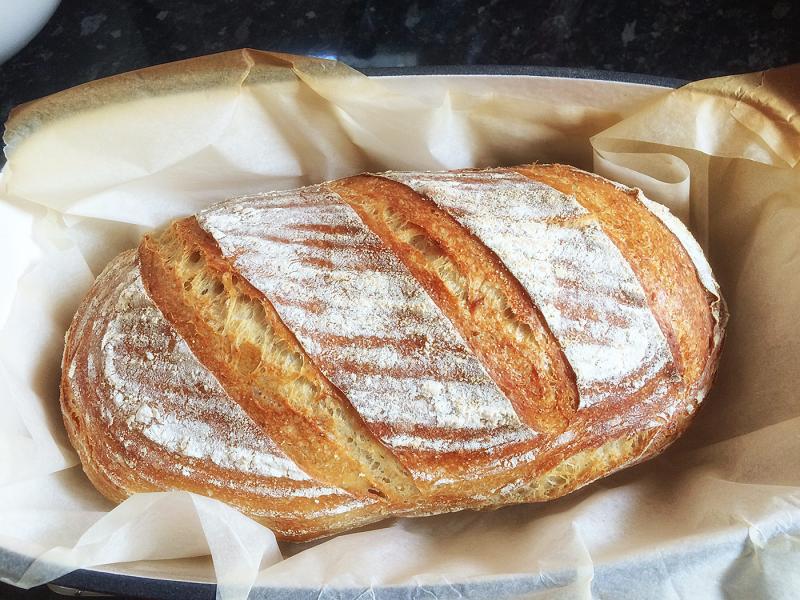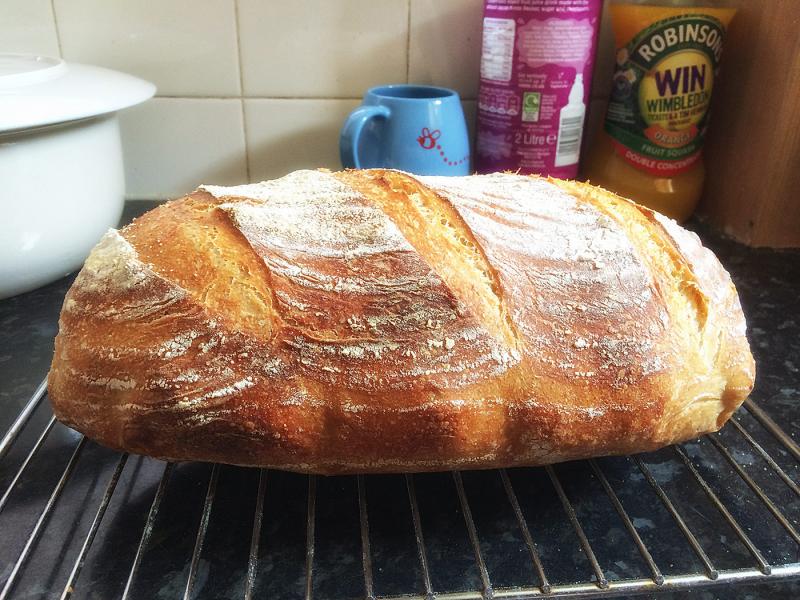I do prefer shaping Boules, it is much easier, but since my Husband bought me this Dutch Oven I gave it a go.
I also had my oblong Banneton * never used before * so that was ok.
When I use a Dutch Oven I do preheat it with the Oven, this time I forgot * oops * so I put it in for about 12 Minutes on
250C.
I am very pleased with the outcome, of course I have not yet cut in to it because we have to finish the other loaf first.
* I so want to see the crumb !! *
Recipe
250g Mature Wheat Starter
450g Strong Bread Flour
50g Wholemeal Flour
300g Warm Water
8g Salt
Mixed it all up, Autolyse in Bowl for 30 Minutes, S&F every 30 minutes for 3 hours , 15 hours bulk fermentation in the fridge, 2 hours bulk fermentation at Room temperature, shaping, final proof in Banneton for 2 hours.
30 Minutes baking in Dutch Oven with Lid on at 250C
20 Minutes baking in Dutch Oven with Lid off at 200C
I did the Crumb shot once the bread has cooled, the light was not so good.
The taste is beautiful, just a very mild Sour which we do like.



Beautiful!
I thank you so much Jo-Jo-
Looks great! Nice and golden.
Thank you so much Bob, it tastes wonderful too:)
what lump of wrought Iron can do when covered in enamel! Love this one inside and out. You have a very low hydration for such a lovely crumb. Eventually, you will up the hydration to at least 72% and then the crumb will be full of huge holes and everything will fall through them :-) Well done and happy baking
I think I stick to my fav. 60%, the size of those holes is big enough:)
I so love baking, I am so hooked on bread baking , it is not normal . wahhhhh
I have forced myself now to have ONE baking day, but I shall bake a storm on that day. ha
Not that there is anything wrong with enamel, but cast iron works just fine without it. I think the enamel just makes the cookware easier to maintain day to day.
Yes, a cast iron would work just as good but as you said, it makes it easier to maintain day to day.
Can't fault it, nor would I wish too.
BTW what's the difference between a "Mature" starter and an immature starter? ;-)
I think Mature Starter is one that has been fed well before using, immature is one that is just out of the fridge and needs feeding a couple of times before using.
* I just call my Starter Mature when he is ready for baking *
Thank you for your kind words reg. the bread:)
I think I'm safe in saying that it is a given, in any recipe that mentions a starter, that it is expected to be "up and running" or active.
mind you, I use unfed starter * immature * for my basic white bread which has also yeast in it, it just gives it that special taste and lightness.
My husband does not want it as a * Pure * Sourdough bread so I am fine with that.
Petra, the loaves look great and the crumb must have been very pleasing when you finally to to see it. Made me smile.
I made my Son eat the rest * about 4 slices * of the OLD bread just so that I could cut in to this one. heheh
I could NEVER be a baker, I would sell bread with the first slice missing as I would want to check the crumb on EACH bread.
I'm with dbm. I'm impressed with the crumb. Of course, if your levain is 100% hydration, the dough is really ... Let's see ... 125g+500g=625g flour. 125g+300g=425g water. So, 425/625=0.68 X 100=68% hydration.
I wonder about the high percentage of levain, though. I'm surprised the bread was only mildly sour.
David
It means a lot to me:)
You are so good with those numbers!
In my mind the bread was a 60% hydration, I did not at all think about the Water in the Starter or the flour.
Something new learned.
I thank you good Sir:)
Great job!!!!
I love bread baking, I love to make the first cut and reveal the crumb.